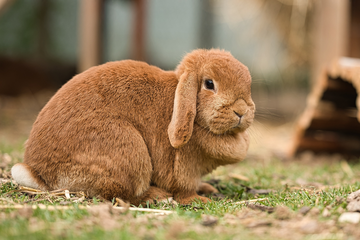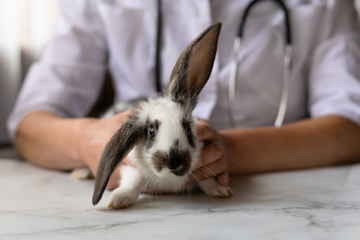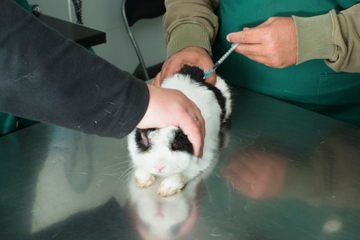Do Rabbits Have Whiskers: A Quick Guide
Rabbits are adorable and curious creatures with unique features that make them a favorite among pet owners. From their twitching noses to their large ears, everything about them seems designed for survival and communication. But what about whiskers? Do rabbits have whiskers? Yes, they do, and these whiskers are more important than you might realize.

Whiskers serve critical roles in helping rabbits navigate their world, detect potential dangers, and even communicate their emotions. Let’s explore the fascinating world of rabbit whiskers and understand why they matter so much to your furry friend.
What Are Rabbit Whiskers?
Whiskers, also called vibrissae, are specialized hairs on various parts of a rabbit's face. You will find them above their eyes, around their mouths, and even on their cheeks. These hairs are not like the soft fur that covers the rest of their bodies. Instead, they are thicker and stiffer, designed for a specific purpose: to act as sensory tools.
Each whisker is deeply rooted in a follicle connected to sensitive nerve endings. This allows rabbits to "feel" their surroundings, even in complete darkness or tight spaces. Whiskers are especially helpful for wild rabbits that need to navigate difficult environments while avoiding predators.
Do Rabbits Have Whiskers? Why Are They Important?
Understanding the purpose of rabbit whiskers can help you better care for your pet. These tiny hairs may not seem important, but they play a huge role in a rabbit’s life. Here are some of the key functions of rabbit whiskers:
1. Helping With Spatial Awareness
Whiskers act as a rabbit's natural radar system. They help rabbits gauge the width of openings and detect nearby objects without having to touch them directly. This ability is crucial for rabbits, especially in the wild, where they often navigate narrow burrows or dense environments.

2. Protecting Sensitive Areas
Did you know that rabbits have whiskers above their eyes? These whiskers act as an early warning system. If an object comes too close, the whiskers send signals to the rabbit’s brain, triggering a blink reflex to protect their eyes.
3. Supporting Night Time Activity
Rabbits are crepuscular, meaning they are most active during dawn and dusk. During these low-light times, their whiskers help them detect obstacles and move around safely. This feature is particularly helpful for wild rabbits trying to avoid predators under the cover of darkness.
4. Communicating Emotions
A rabbit’s whiskers can also reveal its mood. When a rabbit is curious or on high alert, its whiskers point forward. Observing your rabbit’s whiskers can help you read your rabbit's behavior. Learn more about rabbit behavior.
Keeping Rabbit Whiskers Healthy
Now that we’ve answered the question, “Do rabbits have whiskers?” it’s important to understand how to care for them. Whiskers are incredibly delicate and should never be trimmed or damaged. Damaged whiskers can lead to stress and hurt a rabbit’s ability to explore its environment.
To keep your rabbit’s whiskers in top condition:
-
Provide a spacious habitat with plenty of room for exploration.
-
Avoid placing sharp objects or obstacles in areas where your rabbit plays or rests.
-
Use gentle grooming techniques, being careful not to tug on whiskers.
It’s also important to monitor your rabbit’s whiskers for signs of damage. Broken or missing whiskers might indicate stress, poor diet, or an unsafe environment. Addressing these issues promptly can keep your rabbit comfortable and healthy.

How Whiskers Work in the Wild
In the wild, rabbit whiskers are essential for survival. These small but powerful tools help rabbits navigate their underground burrows, locate food, and avoid predators. A rabbit’s whiskers can detect the faintest vibrations in the ground, alerting them to potential threats like snakes or other predators lurking nearby.
Whiskers also play a role in rabbit social behavior. Wild rabbits use whiskers during grooming sessions to bond with their family groups. Observing how they interact can offer insight into the complex social lives of these animals.
Do Baby Rabbits Have Whiskers?
Yes, baby rabbits, or kits, are born with whiskers. Even at this early stage of life, whiskers are fully functional and play a key role in helping kits explore their environment. Since newborn rabbits are born blind, their whiskers act as their primary sense, guiding them as they nurse and move within the nest.
Frequently Asked Questions About Rabbit Whiskers

1. Can Rabbit Whiskers Grow Back If Damaged?
If a rabbit's whiskers are trimmed or damaged, they will eventually grow back.
2. Are All Rabbit Whiskers the Same Length?
No, the length of a rabbit’s whiskers can vary depending on the breed and individual characteristics. For example, larger rabbits may have longer whiskers to match their body size.
3. Can Whiskers Be a Sign of a Rabbit's Health?
In some cases, whiskers can indicate a rabbit's overall health. Brittle or damaged whiskers may signal nutritional deficiencies or underlying health issues. If you notice changes in your rabbit’s whiskers, consult your veterinarian for advice.
The Science Behind Whisker Sensitivity
Each whisker is connected to a specialized muscle that allows the rabbit to move it independently. This ability helps rabbits precisely measure distances and detect subtle changes in air currents. Scientists have studied whisker sensitivity in rabbits and other animals, revealing that vibrissae are among the most sensitive sensory hairs in the animal kingdom.
Whiskers Matter More Than You Think
So, do rabbits have whiskers? Absolutely! These remarkable sensory hairs are crucial for a rabbit’s survival and well-being. They help rabbits navigate their environment, stay safe, and even communicate their emotions. Whether you have a pet rabbit or are simply curious about these fascinating animals, understanding the importance of whiskers can deepen your appreciation for their unique features.
Want to learn more about rabbit care? Check out the 6 reasons why Timothy Hay is a big deal!
To find a vet near you, visit our Vet Locator.

Best Spot: Where Can I Buy Rabbit Food

The Rabbit Skeleton System Explained

Should You Get Rabbit Pet Insurance? Here's Everything You Need to Know






